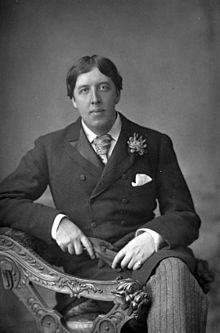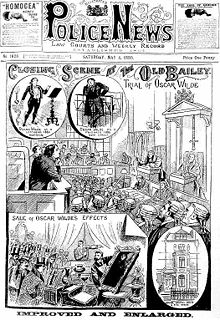De Profundis (Wilde)


De Profundis is an open letter that the Irish writer Oscar Wilde wrote to his former friend and lover, Lord Alfred Bruce Douglas , between 1895 and 1897, during his incarceration in various English prisons . The name of the scripture, which contains about 50,000 words, is taken from Psalm 130 : “ De profundis clamavi ad te Domine.” - “ From the depths , Lord, I called to you”.
Emergence
The creation of De Profundis marks the low point in Wildes Leben. On May 25, 1895, he was sentenced to two years of hard physical labor in prison for fornication - which was then considered a criminal offense for homosexual practices. Because of the scandal surrounding his contacts with male prostitutes , his wife had left the country with their children. His mother, Jane Francesca Elgee, died in 1896 during Wilde's incarceration . He was also declared bankrupt , and the severe conditions in which he was detained were so bad that he never fully recovered.
Wilde was consecutively incarcerated in the Pentonville , Wandsworth and Reading penal houses. He was not allowed to post the letter from prison, but he was able to take it with him after the end of his sentence and left the work to his friend and editor Robert Baldwin Ross with the request that Alfred Douglas send a copy. It could never be clarified whether Ross complied with this request. Douglas denied ever receiving the letter.
Publication history
In 1905, about four years after Wilde's death, S. Fischer in Berlin published a book edition edited and introduced by Max Meyerfeld , which included a publication in the Neue Rundschau (Vol. 16, No. 1–2, Jan.–), also published by Fischer. Feb. 1905). The book was published on February 11, 1905 or a few days earlier. The English, much shorter edition, which Ross had decided on after all and which was delivered on February 23, 1905, came about two weeks earlier. The 1908 edition of Wilde's collected works contains a slightly longer version. Ross eventually left the original to the British Museum on condition that it would not be published before 1960. In 1949, Wilde's son Vyvyan Holland published another version of the letter. It contained the previously unpublished parts, but was based on a partly faulty typewriter copy that Ross Holland had left him. The manuscript was first published completely and correctly in 1962 in the volume The Letters of Oscar Wilde . This version of the letter was titled De Profundis; Epistola: In Carcere et Vinculis (Eng. From the depths; Epistle : In Captivity and Fetters) included in The Complete Letters of Oscar Wilde (London and New York, Volume I of 2000), which has been expanded to include additional letters .
content
In De Profundis , Wilde views his previous life critically and describes it as superficial and hedonistic . He describes the conditions of his detention, for example the day he was handcuffed under the eyes of a mocking crowd at the Clapham Junction station , and his now humble emotional state after much suffering. After taking stock of the financial situation (“I am completely penniless, and absolutely homeless.”), He comments that neither morality, religion nor reason will help him in the difficult times ahead. He makes bitter reproaches to the addressee Alfred Douglas. At the same time, De Profundis is an apology for wild life; he argues that with his rise and fall he is a man who was symbolically related to the art and culture of his age.
Footnotes
- ↑ see publisher's announcement in the Börsenblatt für den deutschen Buchhandel [Leipzig], vol. 72, February 11, 1905, p. 1452
- ^ "I grew careless of the lives of others. I took pleasure where it pleased me, and passed on. [...] I was no longer the captain of my soul, and did not know it. I allowed pleasure to dominate me. I ended in horrible disgrace. "
- ^ "I have passed through every possible mood of suffering. [...] There is only one thing for me now, absolute humility. "
- ^ "Morality [...] Religion [...] Reason does not help me."
- ↑ See Drabble, Margaret: The Oxford Companion to English Literature . Oxford University Press, Oxford 1985. p. 1067.
- ^ "I was a man who stood in symbolic relations to the art and culture of my age."
literature
- Hart-Davis, Rupert: The Letters of Oscar Wilde . London 1962. (Expanded new editions: Holland, Merlin and Hart-Davis, Rupert: The Complete Letters of Oscar Wilde . London and New York 2000. )
- Drabble, Margaret: The Oxford Companion to English Literature . Oxford University Press, Oxford 1985.
Web links
- De Profundis at Project Gutenberg (English). Abridged version from 1913, edited by David Price.
- Manuscript of 'De Profundis' by Oscar Wilde , complete reproduction of the British Museum manuscript.
